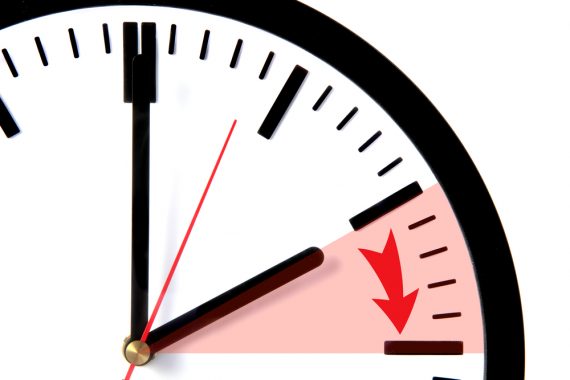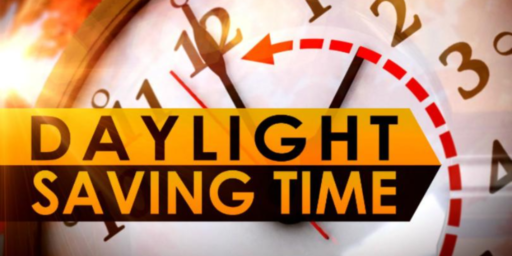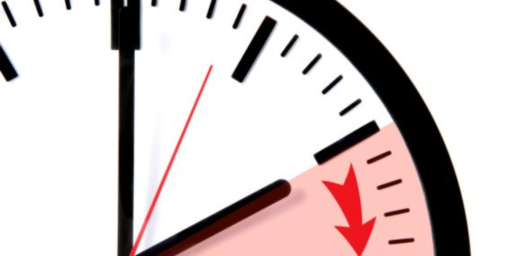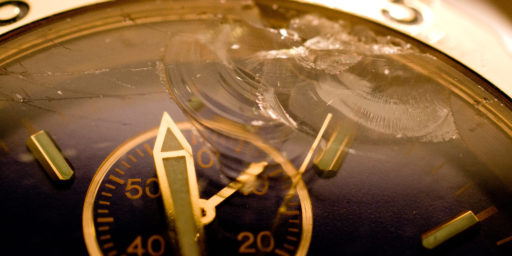Daylight Saving Time: Bad For Your Health, Not Good For Much Else
There's little benefit, and much cost, to moving our clocks back and forth every six months. So why do we do it?
It probably shouldn’t come as a surprise to learn that when you set your clock ahead before going to bed last night, it wasn’t necessarily good for your health:
Monday morning risks can be more serious than needing to nap at your desk: researchers at Loyola University School of Medicine report that there are more workplace injuries and traffic accidents the day after we turn our clocks ahead. Heart attack rates increase by as much as 10%. The time change is hardest on those who are chronically sleep deprived: the National Sleep Foundation estimates that more than one-third of Americans are dangerously sleepy.
While most people will adjust to the time change in a couple of days, night owls and those who habitually grab fewer than seven hours of sleep a night can take a full week to catch up.
As if that weren’t bad enough there’s absolutely no evidence that Daylight Saving Time results in reduced energy use:
Here’s a raft of studies on the subject. Most of them find that while households do use less lighting during daylight saving, thanks to the longer, brighter afternoons, they also end up cranking up the air conditioning more, which makes it either a wash or a net loser for energy use. A 2008 paper (pdf) by economists Matthew Kotchen and Laura Grant examined what happened in Indiana when, thanks to a change in state law, all counties suddenly had to shift to daylight saving.
The study found that, not just in Indiana, but nationwide, the change from Standard Time to Daylight Saving Time actually increases energy use:
The history of Daylight Saving Time (DST) has been long and controversial. Throughout its implementation during World Wars I and II, the oil embargo of the 1970s, consistent practice today, and recent extensions, the primary rationale for DST has always been to promote energy conservation. Nevertheless, there is surprisingly little evidence that DST actually saves energy. This paper takes advantage of a natural experiment in the state of Indiana to provide the first empirical estimates of DST effects on electricity consumption in the United States since the mid-1970s. Focusing on residential electricity demand, we conduct the first-ever study that uses micro-data on households to estimate an overall DST effect. The dataset consists of more than 7 million observations on monthly billing data for the vast majority of households in southern Indiana for three years. Our main finding is that—contrary to the policy’s intent—DST increases residential electricity demand. Estimates of the overall increase are approximately 1 percent, but we find that the effect is not constant throughout the DST period. DST causes the greatest increase in electricity consumption in the fall, when estimates range between 2 and 4 percent. These findings are consistent with simulation results that point to a tradeoff between reducing demand for lighting and increasing demand for heating and cooling. We estimate a cost of increased electricity bills to Indiana households of $9 million per year. We also estimate social costs of increased pollution emissions that range from $1.7 to $5.5 million per year. Finally, we argue that the effect is likely to be even stronger in other regions of the United States.
When Congress decided in 2005 to extend Daylight Saving Time by a month, one of the justifications cited for the move was the claim that it would reduce oil consumption by at least one percent because of the impact on driving habits. In 2008, a Department of Energy study [PDF] found that the move had no appreciable impact on gasoline consumption.
Additionally, the impact of the time change on the economy seems negligible at best:
Retailers love the extra sunlight — it means that there are more customers around who are willing to go out and shop. The all-powerful golfing industry is also a big fan, apparently. On the other hand, daylight saving can cut into sales for movie theaters and reduce the audience for prime-time television — people go out and enjoy the evening air instead of staring at screens inside.
Finally, one economist has calculated that the opportunity cost of Daylight Saving Time:
In 2008, economist William F. Shughart did a back-of-the envelope calculation and estimated that the opportunity cost of daylight savings time was $1.7 billion per year:
“Although it is unclear what benefit Americans derive from adjusting their timepieces twice a year, the costs they bear are clear. As the Benjamin Franklin adage goes: Time is money, and time spent resetting clocks and watches is time that cannot be devoted to other, more valuable uses. Switching between daylight saving and standard time has what economists call an ”opportunity cost.”
Economists typically value the opportunity cost of a person’s time at his or her wage rate. The U.S. Department of Labor’s Bureau of Labor Statistics reports that the average American’s hourly wage was $17.57 in September 2007. Assuming that it takes everyone 10 minutes to move all of their clocks and watches forward or backward by an hour, the opportunity cost of doing so works out to $2.93 per person. Multiplying that number by the total U.S. population (excluding Arizona) yields a one-time opportunity cost for the nation of just under $860 million—or, to be more precise, $858,274,802. Since clocks must be changed twice every year, this back-of-the-envelope calculation must be doubled, to approximately $1.7 billion annually.”
The only benefits that can conceivably attached to Daylight Saving Time would seem to be ones that cannot be quantified, such as the psychic benefit of having daylight last longer into the late afternoon/early evening, meaning that people have more time after normal work hours for outdoor activities. Today’s sunset here in Virginia, for example, is at 7:15pm rather than 6:15pm. By mid-April, we’ll have daylight until nearly 8pm. Is that a good thing? I suppose it is. Of course, if we just stayed on Standard Time, or for that matter made DST itself Standard Time it really doesn’t matter, we’d get longer days anyway since the days will become longer as we get closer to June 21st. Is there really all that much benefit from manipulating the clock every six months like this? I don’t really see it.
So there you have it. Moving the clocks ahead an hour, and then back again seven months later, is bad for your health, it increases the risk of road accidents, it increases energy use, and it has little if any real benefits to the economy or the environment. So, tell me again why we still have it?
Clock Showing Time Change image via Shutterstock







Retailers are in favor of it – there is some evidence it results in more evening shopping. Of course driving to the mall kind of cancels out any ener4gy savings there might be.
I vote for year-round DST. My waking day, and that of most people, is roughly centered at 2 pm. Furthermore, I, and most people, do most of my outside activities (leisure or exercise) in the evening as opposed to the morning, and therefore daylight is more valuable later on.
I’d probably be happiest with having the sun at its highest at 2 pm each day, but in the spirit of compromise with high-noon traditionalists, I’ll settle for 1 pm. So let’s extend DST to the rest of the year.
I’m not exactly sure what universe you live in, Doug, but LMGTFY. Sunset in Warrenton, VA, was 6:15 pm yesterday, and will be 7:15 pm today.
Actually, it’ll be almost 8 pm (7:49 pm on April 15th).
/smh
How much sense it makes depends on where you live within your time zone.
@Andyman: Are you east or west of your zone’s central meridian? It matters as “noon” can be as much as a half hour off either way depending. What you may want is to shift your local apparent noon by two hours.
We should really just get off this regular schedule stuff. Think of how nicer traffic would be if everyone working days didn’t go or get off from work in the same 2 hours. And Walmart is open 24 hours so we shopping isn’t a problem. It all goes back to the train fetish. Some, we won’t name names, love their schedules, for trains, for work, for meetings, for shopping and they are bound and determined to make us all suffer for their OCD.
Anyway, I think we should trust the government to do what is right. But that may just be the lost sleep talking.
@Boyd:
I was (foolishly perhaps) relying on the Weather app on my phone. The numbers didn’t seem right, but I forgot to check before hitting publish.
Eh, I love the extra daylight. I would also be all for extending daylight savings time to 12 months a year.
I have Seasonal Affective Disorder and I am a night owl, so I would love to have DST year-round. I already intentionally live in the southwest corner of my time zone (Austin, TX) so as to maximize evening daylight.
For me, today is my favorite holiday. And the adjustment in the fall is the harbinger of almost certain depression, as my evening commute is suddenly thrust into near-darkness.
@Doug Mataconis: Smartphones is stupid.
@Gromitt Gunn: You would love southern Spain, where I lived for a couple of years. There were midsummer nights when it still wasn’t completely dark at 11 pm.
OTOH, I remember going to work in mid-December at 8:30 am, and it was still dark.
I do like DST for more light in the evenings, than I would otherwise have, but as the days get shorter at both ends it would mean its dark longer for many of us in the mornings during winter. (and this only applies to those that work primarily a first shift type job.) If you’re inside it doesn’t matter much anyway.
I’m very hard-core. I think everyone should use GMT world-wide. Much simpler.
Arizona*, FTW!
Didn’t need to do anything to our clocks! (Except reset the radio in the kitchen, no thanks to Sony; obviously the company believes all Americans do DST.)
* – Offer does not apply in the Navajo Nation.
I just don’t like the feeling that I’m being robbed of an hour of sleep every year.
Sure, the thief gives it back later, but I’d prefer if he hadn’t stolen it to begin with.
Just leave the clock alone.
It’s an archaic custom that should be, like Larry King, retired.
If you ever have to do physical work without air-conditioning in a hot climate, you will want to start and end as early in the solar day as possible.
I agree with many of the other commentators to have DST year round. I like having more daylight in the evening. Sure, mornings are a bit darker, but most people are inside anyways and don’t really do anything in the mornings.
Since if I wake up and the sky is light, I have trouble getting back to sleep, I prefer to have dawn as late as possible.
Speaking from Portugal, where we also have DST, I think that DST is good – in the summer we can go to the beach after work, but without having to wake up during the night in the winter.
I doub that that calculation makes much sense – 10 minutes to move all the clocks? I usually spend less than a minute to move one clock or watch; in America, you have 10 clocks by person? More, the study is assuming that every person will spend 10 minutes moving clocks; if it assumed 10 minutes by family, it could (eventually) be a reasonable number, but by person? In a family “husband+wife+2 kids”, each of them will spend 10 minutes moving clocks (when many clocks in a family are “collective”)?
Down here in FL, there’s not all that much difference between sunset in the Summer or in the Winter. It’s not quite as tidy as on the Equator, but it’s nothing like at higher latitudes. I remember one summer night in Belfast, NI, reading the paper outside at 11pm. Of course, that doesn’t come close to even farther north where the sun doesn’t set during part of June.
I’d opt for year-round DST, with Double-DST in the Summer. I’m definitely a night person, though not adverse to light, and would enjoy longer evenings outdoors.
Oh… and ’10 minutes to change the clocks’? The only clock I have that needs manual adjustment is the one on the microwave. It takes less than five seconds to do that. My other timepieces change on their own.
I think the “opportunity costs” argument is pretty silly. I assume most people will change their clocks when they are at home, not when they are working. So it is meaningless to calculate an opportunity cost as if they were being diverted from productive work. They are actually being diverted for 10 minutes from sitting on their fat arses watching TV. Having to go around to change all the clocks might be the most exercise they get all month. Its a good thing…
@Andyman:
Most states tried dear-round DST during the energy crisis of the early 1970’s but soon cancelled the idea on safety grounds. It meant that children sometimes had to walk to school before it was fully light.
@Tano:
Irrelevant. If they are watching TV instead of working, this mean that they value more these 10 minutes watching TV instead of the $2.93 that they could win if they spend these 10 minutes working; then if they really spend 10 minutes changing the clocks (very dubious), these 10 minutes means a “loss” of, at least, $2.93 (because for them, 10 minutes watching TV have a a value equivalent to, at least, $2.93).
@John Burgess: It takes us more than 10 minutes. The microwave, the stove, the alarm clocks in every bedroom, the wall clocks (one of which is a bitch to get down and back up hanging properly). Oh, we did have a VCR that did DST automatically, but Congress thankfully f**ked that up, too. Then it started changing on the wrong dates so we actually had to fix it FOUR times per year. Luckily we don’t use a VCR anymore.
Anyway, I’m glad someone in the universe agrees with me: DST has far more cons than pros. I don’t even care if it was invented by my buddy Benjamin (actually, it wasn’t), it’s a useless exercise in doing something for the sake of doing something.
Oh, yeah, forgot to put my vote in for DST year-round.
@Franklin:
“It takes us more than 10 minutes (…) Oh, we did have a VCR that did DST automatically”
“Us”, “We”… Probably there is more than one person in your family. You spend 20 or more minutes to change all the clocks?
If 2 person live in your house, and you only takes 15 minutes to change the clocks, you are spending less than 10 minutes by person (remember that the study was made assuming that all people in USA – except Arizona – spend 10 minutes to change the clocks).
@Boyd: “Time is relative” Einstein
The suggestions made by some (DST year-round, double DST, etc.) are a good indication of why DST is a bad idea: because everyone’s schedule and preferences for daylight are different. Instead of a government-mandated one-size-fits-all policy, we should just have more flexibility in setting our work hours so we can spend more time outside in the evening if we want to, or wake up to daylight if we want to, etc. To whatever extent government policy can encourage such flexibility, it should do so.
@ck: That’s a good argument for better/greater workplace flexibility, but doesn’t actually say anything about DST. With sufficiently great flexibility, it wouldn’t matter what the clock said: you’d work when you wanted to no matter what the sun or the clock was doing.
@Racehorse: Time ain’t no relative of mine!
@ck: I was with you up until you said, “To whatever extent government policy can encourage such flexibility…” I’m against the government encouraging or discouraging corporate stupidity. As easy as it may sound, the fedgov has a record of screwing up that kind of stuff whenever they try.
Ha. I remember when I was working in Japan and someone from the Japanese government came to me to talk over implementing DST in Japan. Tried to talk them out of it, pointing out how much retrofitting they would have to do of signal systems, etc., but no go….
Oh well, you win some, you lose some.
Wow, so we have a government policy that achieves the exact opposite of its stated objective, but is still relentlessly implemented? That’s a first!
If you live on a farm it makes sense.
I’m actually finding myself much more in sync with “other people’s time” this morning. I wonder how long that effect will last …
@Vast Variety: If you live on a farm can’t you just make your own hours?
If we don’t all use GMT, the second-coolest thing would be a smartphone that sets 0 at the local sunrise. Ooh, and we could go decimal ….
@Moderate Mom: It’s not “extra daylight.” It’s later sunsets in exchange for later sunrises. The government doesn’t actually have the power to slow the earth’s rotation.
And speaking as an early riser, I hate DST…
How about a year-round compromise: Permanent half-hour DST. Clocks are set thirty minutes ahead of standard, satisfying both early risers like me and those who like evening light. No more early march or november ‘jolt’ – the days gradually shorten & lengthen.